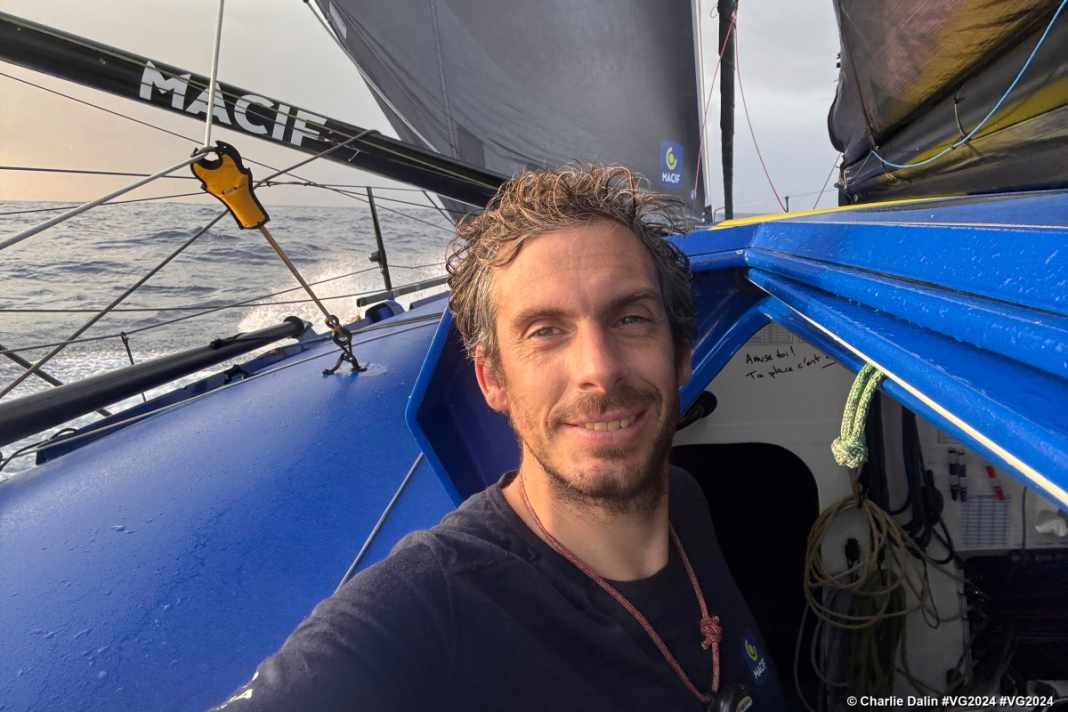





The leading duo continues to sail at full speed in the trade winds on a long beat towards the Azores High. Charlie Dalin ("Macif Santé Prévoyance") leads by almost 190 nautical miles ahead of Yoann Richomme (Paprec Arkéa). They will soon cross a ridge of high pressure where the wind will ease a little. They will then reach a strong front that will allow "a clear passage to the south-east of the Azores", according to Vendée Globe weather consultant Basile Rochut. The closer Dalin gets to the high pressure ridge, the more Richomme can catch up, but the route planning shows that Dalin has a clear advantage and could cross the finish line on Tuesday.
Fabulous record for the men
The tenth edition of the Vendée Globe will come to an end with a flood of records after a number of section bests have already been set. That is now foreseeable. After the quiet and rather slow "Corona edition" four years ago, this time things are moving faster. The new records will not be close to the old ones, but will be well below them!
The overall race record, which Armel Le Cléac'h set in the 2016/2017 race with 74 days, 3 hours, 35 minutes and 46 seconds, will fall. Charlie Dalin is currently sailing towards a possible new record of an incredible 65 or 66 days of racing, if it remains between 14 and 15 January. At this stage of the race, Dalin still has 1939 nautical miles to cover, compared to 3734 nautical miles for Armel Le Cléac'h eight years ago.
Even if the dominator of this edition should stumble, some skippers will finish behind him with times far below the eight-year-old record. At least Yoann Richomme (2128 nautical miles to the finish) and third-placed Sébastien Simon (2705 nm) are well below Armel Le Cléac'h's distance at the time.
The chasing pack has fewer record-breaking prospects.
Your current distances to the destination:
- 4th Jérémie Beyou, 4359.5 sm, "Charal"
- 5 Sam Goodchild, 4362.2 sm, "VULNERABLE"
- 6 Thomas Ruyant, 4391.2 sm, "VULNERABLE"
- 7 Boris Herrmann, 4393.6 nm , "Malizia - Seaexplorer"
- 8 Paul Meilhat, 4462.7 sm, "Biotherm"
- 9. Nicolas Lunven, 4489.4 sm, "HOLCIM - PRB"
- 10 Justine Mettraux, 4493.9 sm, "TeamWork - Team Snef"
- 11 Clarisse Crémer, 4785.0 sm, "L'Occitane en Provence"
Boris Herrmann with opportunities
Boris Herrmann still has every chance of working his way up to fourth place. He is just 34 nautical miles short of that. It is currently unknown to what extent the damage caused by a nearby lightning strike, which affected parts of his on-board electronics, will prevent him from fully attacking. "Thanks to the Shore team, we were able to get an autopilot and a set of wind instruments working again. That's really good!"
But he doesn't have much else for the time being: "The radar is broken. The screen here is no longer working. I no longer have any data for the loads, the foil rake. The keel system is no longer working normally. I have to do a lot more manually than normal. But I can charge the batteries, I have power, the watermaker..."
Justine Mettraux on course for a record
The race record for women will also fall. Clarisse Crémer had already achieved great things at the end of her Vendée Globe premiere in 2020/2021 as twelfth and the first woman to finish four years ago. With her solo around the world in 87 days, 2 hours and 24 minutes, she had beaten the previous 20-year record held by icon Ellen MacArthur (94 days, 4 hours) by more than seven days. At the time, Ellen MacArthur described Clarisse Crémer as having completed an "exceptional lap". But Clarisse Crémer's record will be significantly beaten once again at this Vendée Globe.
The first contender for a new female record at the Vendée Globe is not Crémer herself, who has been plagued by technical setbacks, but the Swiss Justine Mettraux on "TeamWork - Team Snef". Since Christmas Day, she has been the only skipper to consistently finish in the top ten. At the end of race day 60 in the morning of 9 January, she was in tenth place, around 100 nautical miles behind the "Malizia - Seaexplorer" skipper in seventh place in the Herrmann chasing group.
According to the latest forecasts, Justine Mettraux can be expected to finish between 22 and 24 January. This would result in a total race time of up to a good 75 days - twelve days (!) faster than Clarisse Crémer's time four years ago. That would even leave Mettraux plenty of room for missteps, doldrums or other possible adversity.
And lurking behind the Swiss in twelfth and 13th place are "L'Occitane en Provence" skipper Clarisse Crémer and Samantha Davies ("Initiatives - Cœur"). They could also reach the finish line off Les Sables-d'Olonne after 75 to 77 race days and beat the existing record by a large margin.

